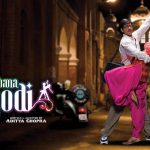‘Salaam-E-Ishq’ is a masala music album composed by Shankar-Ehsaan-Loy, with lyrics by Sameer. It is a star-studded album, featuring some of the biggest names in Bollywood from the ’90s and 2000s. It stills stands as one of the most remembered scores from 2007.
“Dil Kya Kare” is a light and enjoyable song from the album, sung by Adnan Sami. It is a technically superior track, with a standout background score and refreshing vocals from Sami. The song features a variety of unusual musical instruments, which blend beautifully with the voice and chorus. The guitar riffs are also a delight. Sameer deserves kudos for inserting the title of the song into the lyrics, which Sami pronounces with a punch.
“Saiyaan Re”, the next song on the album, has a Joharish feel to it, evoking images of families and relatives gathering together. It is an interesting mix of ‘90s techno beats and the vocals of Shilpa Rao, who got more popularity after the release of ‘Anwar’ (2007). Shankar Mahadevan’s excellent vocals make the song catchy and Shilpa Rao provides adequate support. However, the track lacks energy, power and a dance-floor element. Unfortunately, it also ends up being formulaic. Good tabla accompaniment and qawali pieces make it enjoyable but the appeal is not long-lasting.
“Mera Dil” is a predictable and outdated romantic ballad, lyrically and musically. Despite the quality vocals of Shaan and Nihira Joshi, the song is a bland and repetitive rehash of familiar Shankar-Ehsaan-Loy’s arrangements. It features the same hackneyed tabla beats, bold electric guitar and annoying chorus that have become staples of Karan Johar’s films. The awkward pause in the middle of the song only adds to its predictability.
The title song “Salaam-E-Ishq” is a quintessential Bollywood track with a catchy tune, grand orchestration and a variety of singers. Shreya Ghoshal, Sadhana Sargam, Kunal Ganjawala and Sonu Nigam all deliver excellent performances and the song appeals to a wide audience. The chorus is particularly effective and the use of instruments and lively music keeps the song engaging throughout. The sad portion at the end adds a touch of emotion, making the song well-rounded.
“Tenu Leke” is a high-energy party song with a good mix of techno and traditional Indian elements. Sonu Nigam and Mahalakshmi Iyer deliver effortless vocals and the techno arrangements keep the song hot and happening. “Tenu Leke” did hit the right chords with its fast-paced music and fusion of traditional and techno music, when released.
“Babuji Dheere Chalna” is a re-mastered lounge mix of the classic “Aar Paar” song. Nihira Joshi’s vocals are good, but she sounds too shy at times. The orchestration and arrangements are clean and minimal, but the music becomes tasteless at places with a bland background. The music tries to pick up later but it’s too late and the song ends up being a filler. This is not the best rehash due to its situational nature.
“Ya Rabba” is a beautiful and sombre song with Kailash Kher’s vocals being the strongest asset. The song progresses into a nice melody with Kher’s vocals expressing worry, complex thoughts and depression. The guitars, strings and keyboard sounds from a beautiful combination, creating a lonesome atmosphere. The classical alaaps are also well-exploited. “Ya Rabba” is another powerful rendering by Kailash Kher and a nicely composed song by Shankar-Ehsaan-Loy, where they excel in all departments.
Although the songs in ‘Salaam-E-Ishq’ are original compositions, some of the tunes are recycled. “Ya Rabba” and “Dil Kya Kare” are the only two standout tracks due to their high-quality production, originality and individuality. The music in this film is unlikely to overshadow the glamorous cast, who are numerous enough to carry the film with their foot-tapping dances. Technicalities aside, it is sometimes enjoyable to have a soundtrack that is fully enjoyable and this one is a good listen overall.
Rating: 3/5

